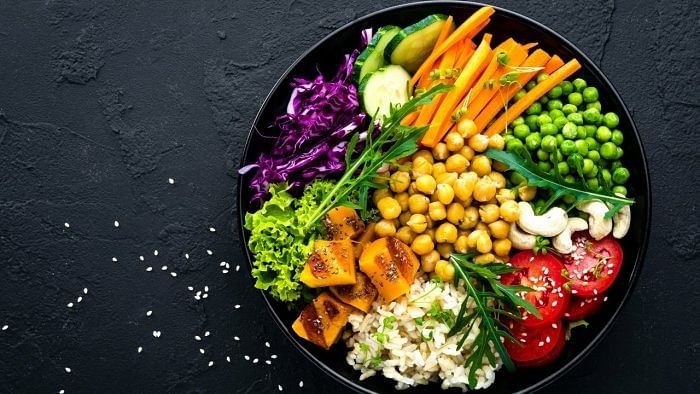
With markets flooded with 'healthy' foods and a long list of experts suggesting a new recipe daily on social and digital media platforms, choosing the right food can be a nightmare for consumers. Almost every other patient I consult asks me the same question: What should I eat to ensure long-term fitness and wellness? The question particularly stresses 'long-term', which has assumed greater significance in the aftermath of the Covid pandemic. My response to such queries is mostly standard: Stick to basic Indian cuisine — daal chawal, roti sabzi, fresh fruits, etc.
A vast majority of everyday Indian foods are rich in nutrition and can ensure long-term good health. Several studies have shown that due to the high use of ingredients like turmeric, yoghurt, lentils, fresh cruciferous vegetables, fruits, and ginger, Indian dishes not only taste and smell great but also provide numerous health-boosting benefits. It's been observed that regular consumption of these foods for years can prevent non-communicable diseases (NCDs) like diabetes and hypertension, help in weight loss, protect heart health, improve the digestive system, boost metabolism, and aid the body's healing process in case of a disease.
Most locally available foods provide the right amount of protein, vitamins, minerals, carbohydrates, fats, and other vital macronutrients. Considering the country's climatic conditions and the genetic makeup of its people, indigenous foods are best suited for Indians and can easily cover their nutrition needs.
Diet and NCDs
The rising burden of non-communicable diseases (NCDs) in India in recent years has left health experts worried. According to a recent report by the Associated Chambers of Commerce and Industry of India (ASSOCHAM), an imbalanced diet is one of the primary reasons for the high rate of NCDs in the country. The report covered 2,33,672 people and 673 public health offices across 21 states and suggested that hypertension, digestive ailments, and diabetes are the most common diseases among Indians, caused primarily due to unhealthy food habits.
The report found that Indians are increasingly consuming diets low in legumes, milk, omega-3 fatty acids, vegetables, fruits, calcium etc., and are instead opting for foods rich in sugar and trans-fats. It concludes that the prevalence of NCDs in India is 116 per 1000 population, which is alarming by all standards.
Focus on freshness
Since most dishes falling under the Indian cuisine are freshly cooked, they have a higher food value than packed items available in the market. One of the banes of global development and advances in transportation and technology has been the frequent movement of foods across geographies. Some say that today, food items travel more than the people who consume them. The packed shelves and refrigerators at our grocery stores and supermarkets stand testimony to this claim. Most of the food items stocked at these facilities are loaded with preservatives and other chemicals and can adversely affect consumers' health. That is why, even when opting for indulgence, it's always better to have a freshly made paratha than a bowl of pasta stored in the refrigerator. People consuming foods rich in preservatives are at a very high risk of cardiovascular diseases.
Further, over the years, indiscriminate use of fertilisers and plant protection chemicals has created many health hazards that previously did not exist and deteriorated the overall agriculture ecosystem. That's why most dieticians and nutritionists promote regionally grown foods as they ensure natural freshness and nutrition and also support local agriculture and the larger economy.
Eat well to stay well
Contrary to many claims made by so-called health experts, there is no single cuisine or food item that can guarantee good health. Only a balanced diet can ensure that. That's why it's better to look beyond the fancy food items in the market that are branded 'healthy' and consume everyday local foods such as daal rice, roti sabzi, raita and chutney, idli sambar, among others. This could well be your best bet to staying healthy and protecting yourself from NCDs and many other diseases.
(Dr Rajesh Kesari is a diabetologist and physician and Expert, ASSOCHAM Illness to Wellness)
Disclaimer: The views expressed above are the author's own. They do not necessarily reflect the views of DH.
Watch the latest DH Videos here: